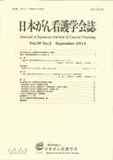Japanese
English
- 販売していません
- Abstract 文献概要
- 参考文献 Reference
- サイト内被引用 Cited by
要旨
本研究は,膵がんと診断された患者が難治性のがんをどのように生き抜こうとしているのかを明らかにし,そこに求められる看護の意味や方向性を検討することを目的とする.研究参加者は2名の女性の膵がん患者であり,治療や療養生活の経過,治療法の選択や今の思い,これからのことなどについて関心事や懸念に沿って語ってもらい,ICレコーダーに録音した.逐語録を作成し,患者の経験の特徴について,Bennerの現象学的人間論を基盤に分析・解釈した.
「再発を見据え,治療を探し求めて生き抜く」,「死がみえてきたとき,生き抜く道を探す」という経験の特徴が明らかになり,彼らが診断時から予後不良という苦悩の中に身を置き,生活の背景に死の不安が常に存在する様相がうかがわれた.彼らは予後不良や死という意味を医療従事者との相互作用を通して取り込み,いずれ再発,治療の手立てがなくなることを理解し受けとめるように期待され,彼らもまたそれに備えようとして格闘していたと考えられた.社会一般が付与する「膵がん=死」という意味づけ,未来への志向を閉ざされた中で生きること自体が格闘であった.難治性がん患者への支援においては,未来への志向性,「膵がん」の意味づけ,医療従事者・患者間の時間の捉え方の異和を,援助方法論の軸に据えることが示唆された.
The objective of this study was to describe the experiences of pancreatic cancer patients who cannot look forward to recovery or long-term survival. A verbatim record was made of interviews carried out with two patients. The characteristics of the patients' experiences were analyzed and interpreted based on the phenomenological approaches in philosophical anthropology advocated by P. Benner.
The narratives of the two pancreatic cancer patients were described as:“being ready to face reoccurrence and to remain alive while seeking successful treatment”, and “to look for a way to face reality when death looms closer”, indicating that the patients were aware that they had a bad prognosis with a high likelihood of recurrence and death. They understood the significance of their bad prognosis and the likelihood of death through their interactions with medical practitioners. They were expected to understand and accept the risk of recurrence of cancer and the limits to medical treatment. It appeared that on their part they were struggling to prepare psychologically for the future. It was concluded that awareness of passing time affected both their present state of living with their end in sight and their efforts to reject the common perception that pancreatic cancer is a death sentence. These results suggest that support theory should be designed to soften the subconscious impact of the ‘refractory’ in relation to pancreatic cancer, which undermines patient motivation to look to the future, and to tackle the differences in physicians' and patients' perceptions of temporality.
Copyright © 2014, Japanese Society of Cancer Nursing All rights reserved.


